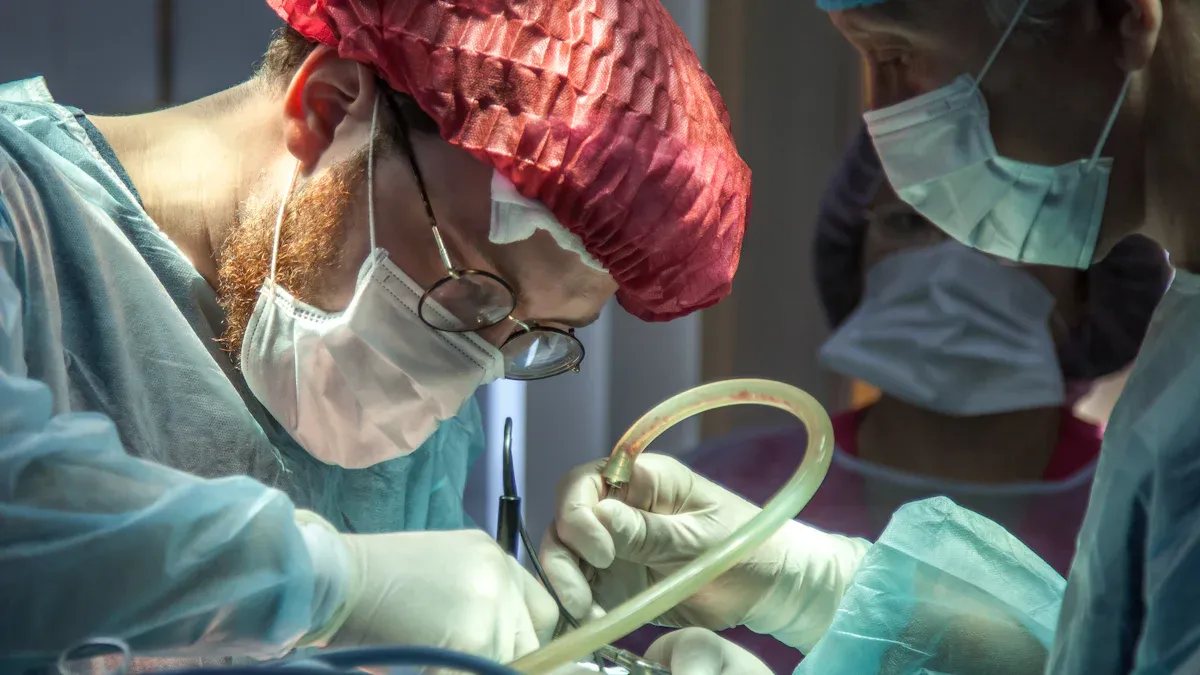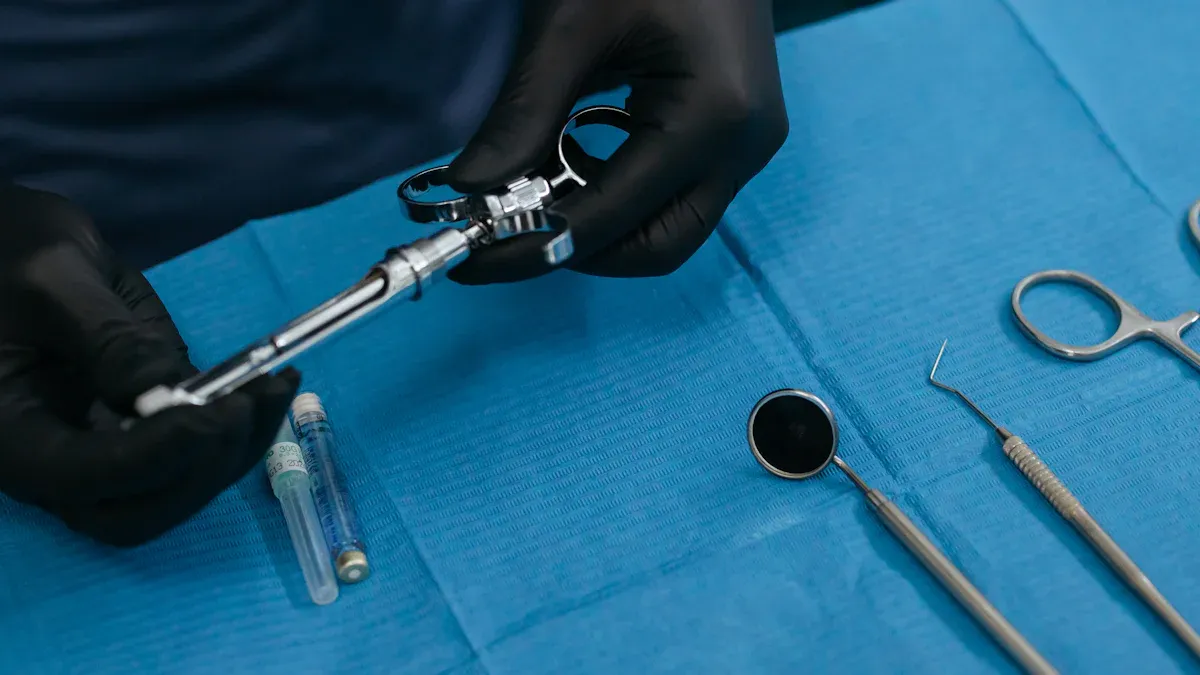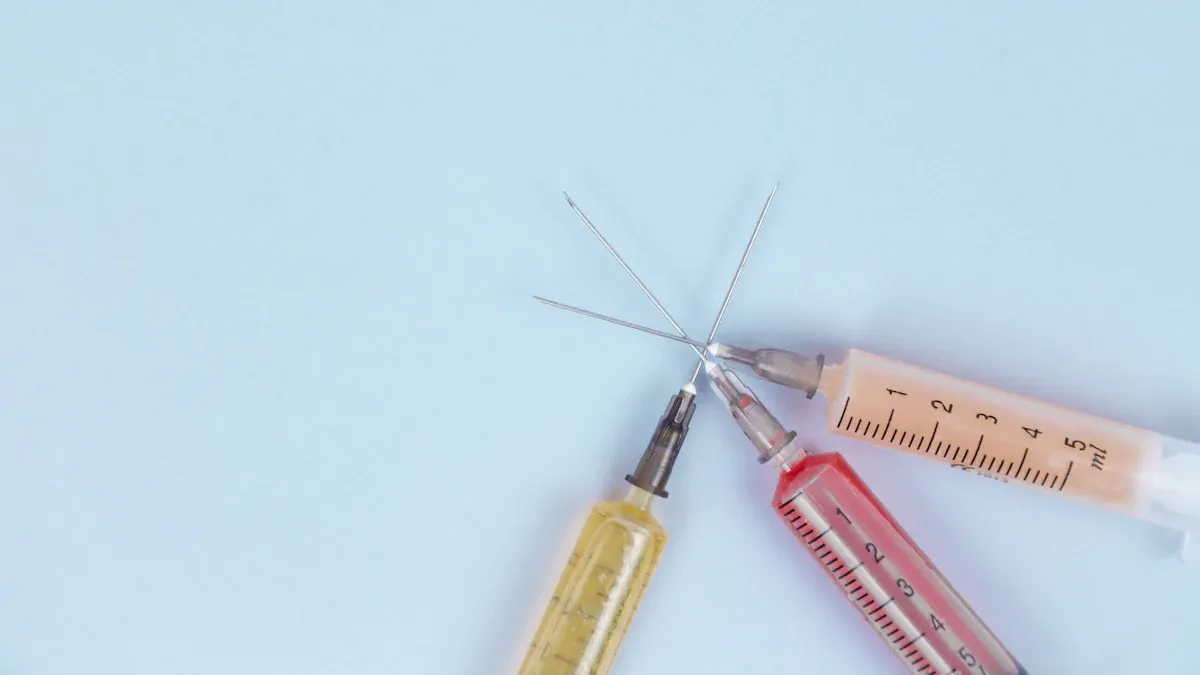Understanding Ultra-Fine PET Tubing for Precision Surgical Applications

Ultra-Fine PET Tubing for Precision Surgery represents a lightweight and biocompatible solution for modern surgical needs. This advanced surgical plastic tubing is crafted from a durable thermoplastic polymer, ensuring both flexibility and strength. Its biocompatibility minimizes risks to the patient, making it a trusted choice in medical procedures. Surgeons rely on Ultra-Fine PET Tubing for Precision Surgery to achieve precision, particularly in minimally invasive surgery. The material’s adaptability allows it to support intricate surgical techniques while maintaining patient safety. These qualities highlight the undeniable benefits of Ultra-Fine PET Tubing for Precision Surgery in enhancing outcomes and improving the overall experience for both surgeons and patients.
Key Takeaways
Ultra-thin PET tubing is light and safe for surgeries.
Its strength and durability help it handle surgery stress well.
The tubing bends easily to move through tricky body parts.
New designs are creating smarter and eco-friendly tubing to help surgeries and the planet.
Using this tubing can mean fewer problems and quicker healing.
Material Properties of Ultra-Fine PET Tubing

Biocompatibility and Patient Safety
Biocompatibility is one of the most critical attributes of ultra-fine PET tubing for precision surgery. This property ensures that the material interacts safely with the human body, reducing the risk of adverse reactions. Meeting stringent biocompatibility standards, PET tubing minimizes complications such as inflammation or infection. This makes it a reliable choice for surgical plastic tubing used in delicate procedures.
Patient safety is a top priority in surgical applications. Ultra-fine PET tubing plays a vital role in maintaining this safety by offering a non-toxic and hypoallergenic solution. Its smooth surface reduces the likelihood of tissue irritation, ensuring a safer experience for the patient. Additionally, the material's resistance to chemical degradation enhances its reliability during prolonged surgical procedures. These benefits underscore the importance of biocompatibility in modern medical devices.
Strength and Wear Resistance
Durability is another key feature of ultra-fine PET tubing for precision surgery. The material exhibits exceptional strength, allowing it to withstand the mechanical stresses encountered during surgical procedures. This strength ensures that the tubing remains intact, even under challenging conditions, providing consistent performance.
Wear resistance further enhances the durability of PET tubing. The material resists abrasion and deformation, making it suitable for repeated use in surgical environments. This characteristic is particularly important for surgical plastic tubing, which must maintain its integrity to ensure patient safety. By combining strength and wear resistance, PET tubing offers a flexible and durable solution for precision surgery.
Flexibility for Precision Surgery
Flexibility is essential for surgical plastic tubing used in precision surgery. Ultra-fine PET tubing excels in this regard, offering the pliability needed to navigate complex anatomical structures. Surgeons rely on this flexibility to perform minimally invasive procedures with greater accuracy and control.
The combination of being flexible and durable makes PET tubing ideal for applications requiring both adaptability and strength. Its ability to bend without breaking ensures that it can accommodate the demands of intricate surgical techniques. This flexibility not only enhances surgical outcomes but also contributes to patient safety by minimizing the risk of tissue damage.
The material properties of ultra-fine PET tubing for precision surgery highlight its versatility and reliability. From biocompatibility to strength and flexibility, these attributes make it an indispensable component in modern surgical practices.
Applications of Ultra-Fine PET Tubing for Precision Surgery

Supporting Minimally Invasive Techniques
Ultra-fine PET tubing for precision surgery plays a pivotal role in advancing minimally invasive surgeries. These procedures require tools that can navigate the body with minimal disruption to surrounding tissues. PET tubing, with its lightweight and flexible properties, meets these demands effectively. Its ability to bend and adapt to complex anatomical pathways allows surgeons to perform intricate tasks without causing unnecessary trauma.
Minimally invasive surgeries often involve catheterization, where precision and control are paramount. PET tubing ensures smooth and accurate catheter placement, reducing the risk of complications. Its biocompatibility further enhances patient safety, making it an ideal choice for these delicate procedures.
AccuPath, a leader in surgical plastic tubing innovation, has developed ultra-fine PET tubing that supports minimally invasive techniques. Their products are designed to meet the highest standards of quality and performance, ensuring optimal outcomes for both surgeons and patients.
Enhancing Surgical Accuracy and Control
Surgical precision relies heavily on the tools used during procedures. Ultra-fine PET tubing for precision surgery provides the accuracy and control needed for successful outcomes. Its smooth surface and consistent diameter enable surgeons to manipulate instruments with ease, even in challenging environments.
In surgical operations requiring catheterization, PET tubing ensures precise fluid delivery and instrument guidance. This level of control minimizes errors and enhances the overall efficiency of the procedure. The tubing's strength and flexibility also contribute to its reliability, allowing it to withstand the demands of complex surgical tasks.
AccuPath's commitment to innovation has resulted in surgical plastic tubing that enhances accuracy and control. Their products are trusted by medical professionals worldwide for their superior performance and reliability.
Ensuring Consistent Fluid Delivery
Consistent fluid delivery is a critical aspect of many surgical procedures. Ultra-fine PET tubing for precision surgery excels in this area, providing a reliable conduit for fluids and medications. Its smooth interior surface minimizes resistance, ensuring a steady flow rate. This consistency is essential for maintaining patient stability during surgery.
In catheterization procedures, PET tubing plays a vital role in delivering fluids to specific areas of the body. Its durability and resistance to wear ensure that it performs reliably throughout the procedure. Additionally, its biocompatibility reduces the risk of adverse reactions, further enhancing patient safety.
AccuPath's surgical plastic tubing is designed to deliver consistent performance in even the most demanding medical environments. Their dedication to quality and innovation has made them a trusted partner for healthcare professionals seeking reliable solutions for precision surgery.
Advancements in Surgical Plastic Tubing Technology
Innovations in Ultra-Fine Manufacturing
Recent advancements in manufacturing processes have revolutionized surgical plastic tubing technology. These innovations enable the creation of ultra-fine PET tubing with enhanced precision and reliability. Manufacturers now utilize cutting-edge techniques such as 3D printing and advanced extrusion methods to produce tubing tailored to specific surgical needs. This customization improves surgical outcomes by ensuring compatibility with complex procedures.
Key innovations include:
The use of biocompatible materials, such as silicone-based tubing, which enhances patient safety and comfort.
Increased focus on infection control, driven by the COVID-19 pandemic, leading to higher demand for sterile surgical tubing.
Precise manufacturing processes that allow for tubing with consistent diameters and smooth surfaces.
AccuPath has embraced these advancements, offering ultra-fine PET tubing designed to meet the highest standards of quality and performance. Their commitment to innovation ensures that surgeons have access to reliable tools for precision surgery.
Contamination Resistance in Medical Environments
Contamination resistance is a critical feature of surgical plastic tubing technology. Ultra-fine PET tubing minimizes the risk of microbial growth, ensuring a sterile environment during procedures. Its smooth surface resists the accumulation of contaminants, making it ideal for use in medical settings.
AccuPath’s surgical plastic tubing incorporates advanced materials that withstand harsh sterilization processes without compromising performance. This durability ensures that the tubing remains effective even in demanding surgical environments. By prioritizing contamination resistance, AccuPath contributes to safer surgical practices and improved patient outcomes.
Note: Contamination-resistant tubing not only protects patients but also reduces the risk of complications during surgery.
Specialized Tubing Designs for Complex Procedures
Complex surgical procedures require specialized tools. Ultra-fine PET tubing offers designs tailored to meet the unique demands of these operations. For example, tubing used in catheterization must provide consistent fluid delivery while navigating intricate anatomical pathways.
AccuPath leads the industry in developing specialized surgical plastic tubing designs. Their products feature advanced engineering that ensures flexibility, strength, and biocompatibility. These designs support surgeons in performing challenging procedures with greater accuracy and control.
The benefits of specialized tubing extend beyond functionality. By reducing the risk of errors and complications, these designs enhance patient safety and contribute to faster recovery times. AccuPath’s dedication to innovation ensures that their tubing remains at the forefront of surgical plastic tubing technology.
Future of Ultra-Fine PET Tubing in Surgery
Integration with Robotic Surgical Systems
The integration of ultra-fine PET tubing with robotic surgical systems represents a significant advancement in modern medicine. Robotic systems demand precise and reliable components to perform intricate procedures. PET tubing, with its flexibility and strength, meets these requirements effectively. Its ability to maintain structural integrity under mechanical stress ensures compatibility with automated systems.
Robotics-compatible tubing designs are becoming essential as robotic-assisted surgeries grow in popularity. These systems require tubing that can navigate complex pathways while delivering consistent performance. PET tubing's biocompatibility and contamination resistance further enhance its suitability for robotic applications. According to industry trends, the demand for robotics-compatible surgical plastic tubing is expected to rise, driven by the increasing adoption of automated surgical technologies.
Development of Smart Tubing for Real-Time Monitoring
Smart tubing capable of real-time monitoring is transforming surgical practices. Ultra-fine PET tubing now incorporates advanced sensors to provide critical data during procedures. These sensors enable surgeons to monitor fluid flow, pressure, and other parameters in real time, enhancing surgical accuracy and patient safety.
Recent studies highlight the potential of smart tubing in airway monitoring. For instance, convolutional neural networks (CNNs) have been tested for their ability to analyze data from smart tubing. Although initial trials involved small sample sizes, the results indicate promising applications for human surgeries. The development of smart surgical plastic tubing aligns with the growing demand for precision and innovation in medical devices.
Evidence Type | Description |
|---|---|
Model Used | Convolutional Neural Network (CNN) |
Accuracy | Potential application in human airway monitoring |
Sample Size | Limited to two rabbits, suggesting need for larger trials |
Future Work | Emphasis on human application and device improvements |
Advancements in Biodegradable Surgical Tubing
Sustainability is becoming a priority in surgical plastic tubing technology. Biodegradable PET tubing offers an eco-friendly alternative to traditional materials. These innovations address environmental concerns while maintaining the benefits of strength, flexibility, and biocompatibility.
The shift toward single-use surgical tools has accelerated the development of biodegradable tubing. Regulatory standards now emphasize the importance of reducing medical waste. PET tubing made from recyclable polymers meets these standards while ensuring patient safety. Additive manufacturing techniques also allow for customizable geometries, enabling patient-specific designs for complex procedures.
Trend/Factor | Description |
|---|---|
Sustainability pressures | Innovations in materials, such as recyclable polymers, are emerging due to eco-conscious demands. |
Shift towards single-use needles | Regulatory standards are pushing for disposable options to prevent cross-contamination. |
Customizable geometries | Additive manufacturing allows for patient-specific designs, particularly in precision oncology. |
The future of ultra-fine PET tubing in surgery looks promising. From robotics integration to smart monitoring and biodegradable materials, these advancements will continue to enhance surgical outcomes and patient care.
Ultra-fine PET tubing has become a cornerstone in precision surgical applications. Its unique properties, including biocompatibility, strength, and flexibility, provide significant benefits to both surgeons and patients. These qualities enhance surgical outcomes by improving accuracy, reducing complications, and supporting faster recovery times. The use of surgical plastic tubing ensures consistent performance in even the most complex procedures, contributing to better patient outcomes.
Future advancements in surgical plastic tubing technology hold great promise. Innovations like smart tubing and biodegradable materials will further elevate surgical practices. As these technologies evolve, they will continue to improve patient outcomes and redefine the standards of modern surgery.
FAQ
What makes surgical plastic tubing biocompatible?
Manufacturers use medical-grade materials to ensure surgical plastic tubing interacts safely with human tissue. These materials undergo rigorous testing to meet biocompatibility standards, reducing risks like inflammation or infection. This property ensures patient safety during surgical procedures.
How does surgical plastic tubing enhance minimally invasive surgeries?
Its lightweight and flexible design allows precise navigation through complex anatomical pathways. This adaptability minimizes tissue damage, enabling surgeons to perform intricate tasks with greater accuracy. The tubing's smooth surface also ensures consistent fluid delivery during procedures.
Can surgical plastic tubing be reused?
Most surgical plastic tubing is designed for single-use to prevent cross-contamination. However, some types can withstand sterilization processes for reuse. The decision depends on the tubing's material and the specific surgical application.
What are the benefits of using ultra-fine PET tubing in surgery?
Ultra-fine PET tubing offers strength, flexibility, and biocompatibility. These features improve surgical precision, reduce complications, and support faster recovery times. Its durability ensures consistent performance, even in demanding procedures.
How does contamination resistance improve surgical outcomes?
Contamination-resistant tubing minimizes microbial growth, ensuring a sterile environment during surgery. This feature reduces infection risks and enhances patient safety. Advanced materials and smooth surfaces contribute to this critical property.
See Also
The Importance of Etched PTFE in Minimally Invasive Surgery
The Critical Role of Ultra-Thin PET Tubing in Healthcare
Key Uses of Ultrathin PET Heat Shrink Tubing in Medicine

